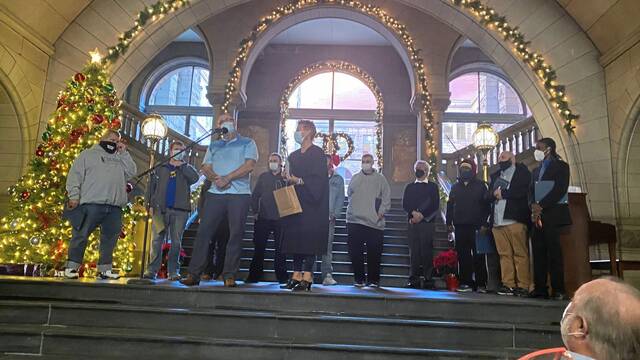https://naviga.triblive.com/local/allegheny-county-mental-health-court-program-marks-20th-anniversary-graduation/
Allegheny County Mental Health Court program marks 20th anniversary, graduation

Timothy Treganowan, who has been diagnosed with borderline personality disorder, anxiety and post-traumatic stress disorder, became addicted to heroin at age 27 after he broke his back and was prescribed opioids.
In 2017, while incarcerated for burglary and receiving stolen property — crimes committed, he said, to fuel his habit — Treganowan qualified for a spot in Allegheny County’s Mental Health Court.
He stayed clean for 19 months before he relapsed, using heroin for just a couple days. Treganowan got another chance in the program and that time, he said, remained clean for 17 months.
But then, on Sept. 15, 2020, he relapsed again.
“I used one time and died,” he said.
His ex-girlfriend found him not breathing and purple, called paramedics, and he was brought back to life. Then he got locked up again.
“I was sitting in that county jail, thinking, ‘How did I get here again?’” Treganowan said. “I made a decision that day. I stopped being selfish. ‘My family deserves better. I’m capable of so much more.”’
Treganowan asked Allegheny County Common Pleas Judge Beth A. Lazzarra, who presides over Mental Health Court, for another chance.
She gave it to him.
“We work with them until there’s nothing left that we can do,” Lazzara said. “Tim Treganowan would have been thrown out of every other program.
“As long as we’re still seeing something positive, and we can get them help, we’re going to help them.”
On Monday, Treganowan, 44, of Bethel Park, was one of 12 people who graduated from Mental Health Court, which is marking its 20th anniversary.
“They saved my life,” he said. “This is the first time ever I don’t have a feeling of impending doom. I can’t imagine living the life I used to.”
Mental Health Court was created in 2001 and has been overseen by four judges, with Lazzara presiding over it for the last 10 years.
“It is, literally, the best thing I do in my professional life,” she said. “To see people who are just broken – they’re at their worst when we get them – to see them grow and blossom.”
Success for participants means rebuilding relationships, maintaining employment and treatment.
“The real lows – we’ve had people die – when I first started, that was the hardest thing for me. We can’t save everybody,” she said.
But, Lazzara said, she doesn’t feel any burnout.
“You feel so proud these people have made such significant life changes. It’s awesome.”
Overall, the graduation rate for those in Mental Health Court since 2008 is 72%. In 2020, the rate was 75%.
Statistics from 2017, showed that 95% of graduates that year had no additional arrests within six months, and 80% remained arrest free for a year, Lazzara said.
To qualify for the program, a participant must have a persistent, serious mental illness, and be charged with a non-violent felony, or misdemeanor crime.
The program is designed to divert participants from jail into community-based services that help them to maintain treatment, housing and support. By providing additional resources — as part of intensive supervision — Lazzara said, participants have a greater chance of success. She is currently working to develop another part of the program that would allow for charges to be reduced or ultimately withdrawn upon successful completion.
About 80% of participants have alcohol and drug involvement in their diagnoses, the judge said. As part of their service team, participants have a minimum of two supports, but more often a half dozen or more. They include a drug and alcohol case manager, peer support person, a probation officer, a Justice Related Services representative and service coordinator.
“We really surround people with a lot of supports and help,” Lazzara said.
Ryan Murphy, 29, of the North Hills, struggled with alcohol for about 10 years. In late 2018, he was arrested for driving under the influence and resisting arrest. After spending about four months in jail, he was admitted to the Mental Health Court program.
He, too, graduated on Monday. Murphy attributes his success to working the program. He went to in-patient rehab, then did outpatient treatment and attended Alcoholics Anonymous meetings. He still sees a therapist once a month.
Murphy said it also helped him that he had a supportive employer and family throughout the process, as well.
“I did everything they told me to do, and it didn’t fail me,” he said. “They set you up with the tools to do it yourself. The only thing is, you have to want it.
“If it wasn’t for that program, I probably would have gone to prison.”
Copyright ©2026— Trib Total Media, LLC (TribLIVE.com)
